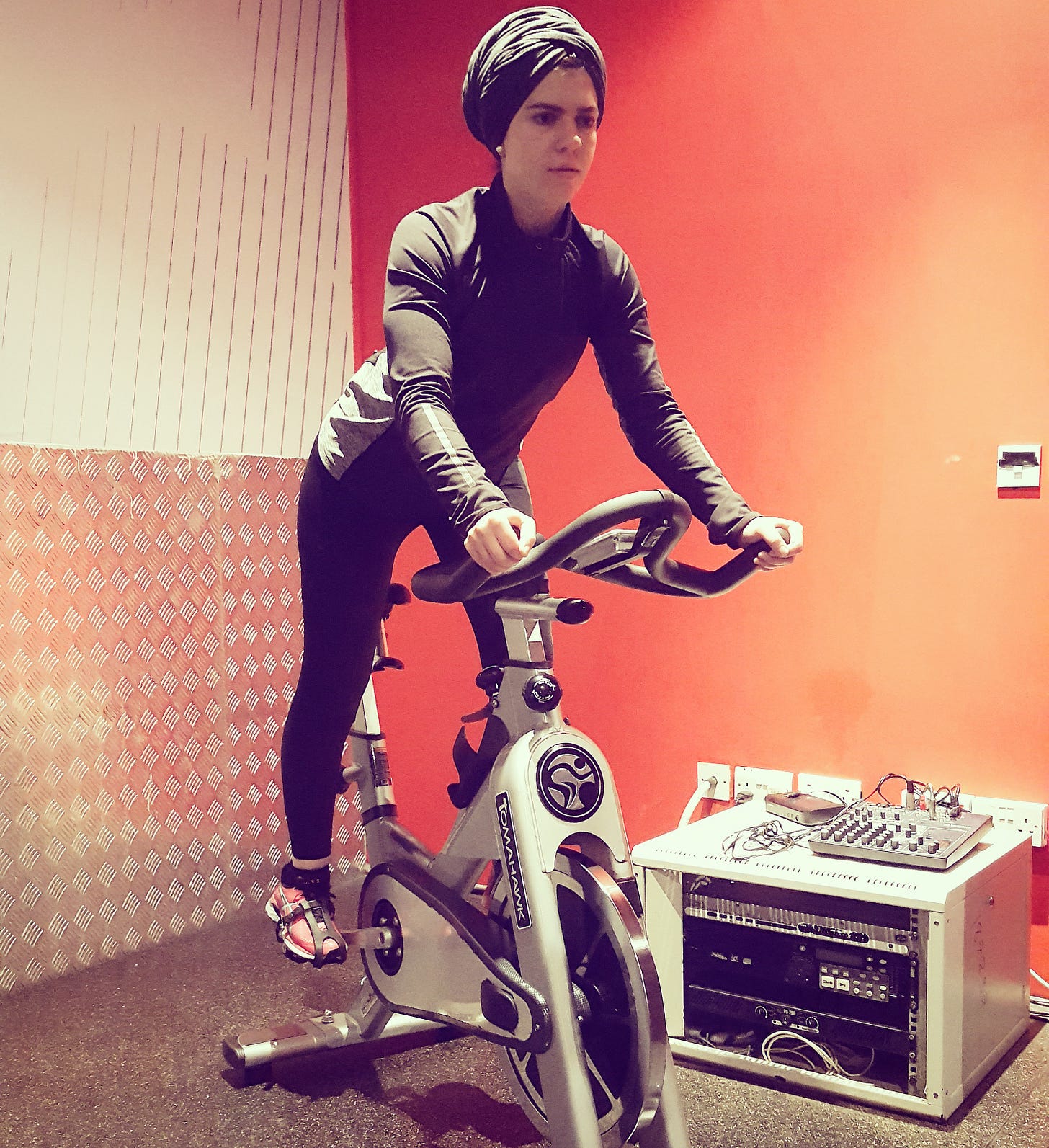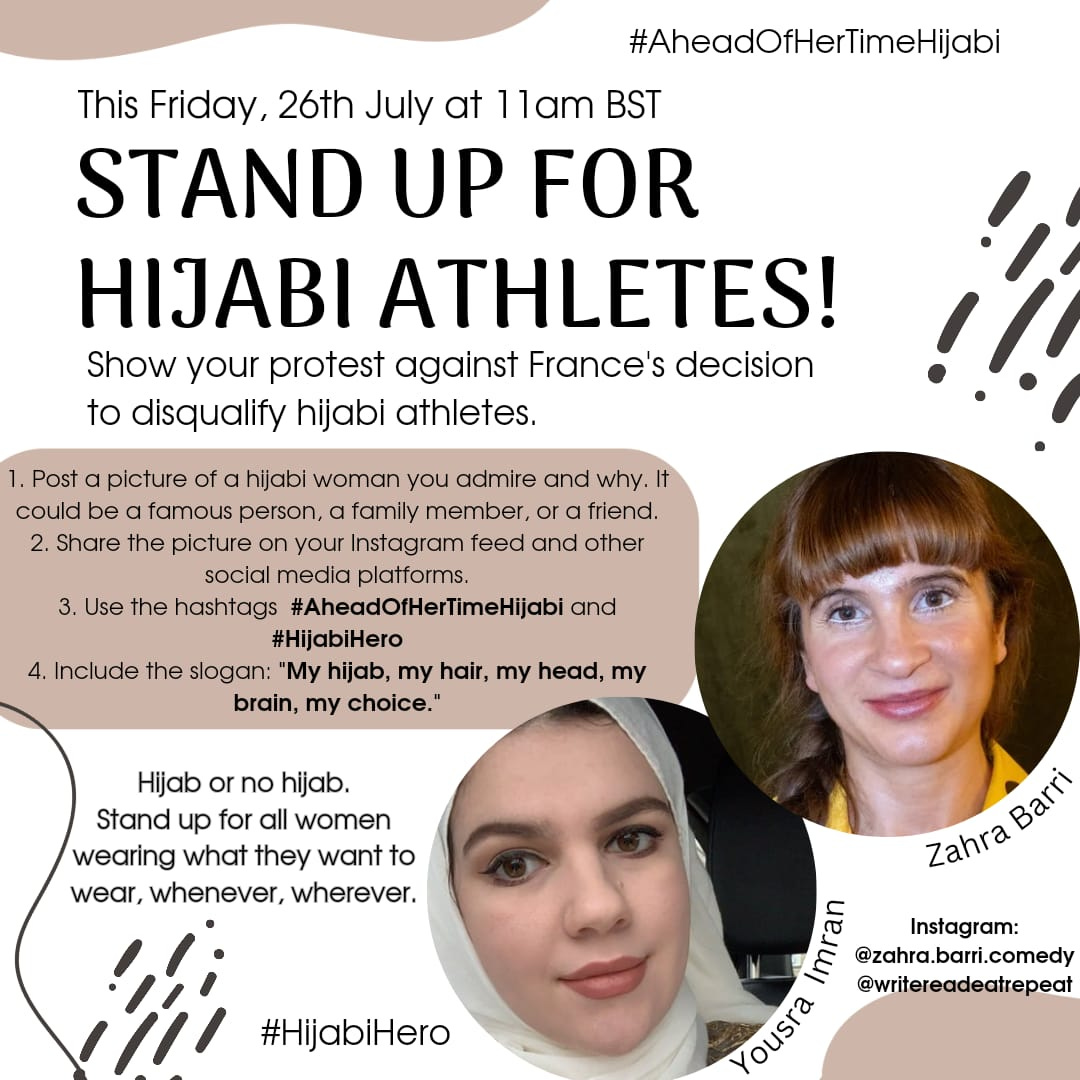My body my choice, except when it comes to hijab
On France's banning of the hijab for French Muslim women wanting to compete at the Olympics
Marhaba and hello! Welcome to ‘Eyb, my newsletter in which I write frankly on topics that I would be told were shameful or ‘eyb as a young Arab women. I also write on topics affecting girls, women and marginalised communities. If you’ve recently subscribed, a double welcome to you!
You may or may not have heard that France has banned French Muslim women who want to compete in the Olympics (which starts on Friday) from wearing the hijab. Athletes from other countries are still allowed to wear it.
The French government know that saying it’s not safe (this was their prior excuse) no longer stands because of the plethora of female Muslim athletes worldwide who wear sports hijabs while training and competing. I used to be a personal trainer and group fitness class instructor and wore my hijab without any health and safety issues.
Me back in the day, teaching a spinning class
The real excuse has come out - the IOC says, ‘They must respect the principles of secularism (laïcité) and neutrality, which, according to French law, means prohibition from wearing outwardly religious symbols, including the hijab, veil and headscarf when they are acting in their official capacity and on official occasions as members of the French national team.’
Human rights groups, including Amnesty International, have said that this decision breaches human rights. In fact, Amnesty International has written an entire report about the discrimination that French Muslim women in sports face.
The ban got me thinking. A lot. It got me thinking about how France’s motto of 'liberty, equality, fraternity' is in direct opposition to its forceful secularism. France focuses on the literal meaning of equality - that everyone must be the same - and not on equity, which realises that each individual has different circumstances. Other countries have started to replace the word ‘equality’ with ‘equity.’ France hasn’t, showing that it is not a progressive country.
Moreover, there’s the fact that secularism in France is not a choice. How does this make the French government any better than authoritarian regimes such as Iran, which forces Iranian women to wear the hijab? Nadeine Asbali writes brilliantly about this in her book, Veiled Threat.
There is another thing. Where has been the outcry (except for human rights groups) for France’s banning of the hijab for French Muslim athletes?
We all stood in solidarity with our sisters in Iran and Afghanistan when a regime forced them to wear the hijab.
Why don’t we do the same when women are banned from wearing the hijab?
I think the real reason - the one many won’t admit openly - is that deep down for many people, they don’t like the hijab. As much as they try to tolerate it or process it in their heads, they still can’t understand why a woman must cover her hair while her male counterparts do not. I don’t think this is a necessarily bad thing. I’ve had these thoughts myself. I have worn and not worn the hijab and have re-examined my reasons for doing so many times. But at the end of the day, as someone living in Britain, I have had the freedom and choice to wear it or not wear it. Our sisters in France, Iran and Afghanistan don’t.
As I’ve said in other articles, feminism and activism cannot be selective. When we stand up for women, we must respect their religious choices, even if they do not align with ours or don’t make sense to us.
Like I said in this substack I wrote shortly after Mahsa Amini was murdered by the Iranian regime, this isn’t about the hijab vs no hijab. It’s about the patriarchy in all its forms - whether under the guise of religion, or the guise of liberalism and secularism - policing women’s bodies and taking away their agency.
Here’s what you can do…
My amazing feminist sister, author and comedian Zahra Barri, and I, have come up with a little idea. On Friday 26th July, the day of the Olympics opening ceremony, we invite you to stand in solidarity with our French Muslim sisters on social media by making this Instagram post, following the instructions and using the hashtags in the picture below:
We look forward to seeing who you’ve chosen as your #HijabiHero!
If you enjoy my writing and want to read more, consider buying my book, semi-autobiographical novel Hijab and Red Lipstick. Hijab and Red Lipstick has appeared on BBC Radio and in Elle, Harper’s Bazaar and Vogue, and was longlisted for The Diverse Book Awards 2021.
Find it on Amazon, Waterstones, Blackwell’s and the Hashtag Press Shop. If you have a local bookshop, you can ask your bookseller to order it in for you.








I had no idea you were writing this and I've written almost the exact same article-albeit mine isnt quite as eloquent because ive done a pun on Emily in Paris/Hijabi in Paris x